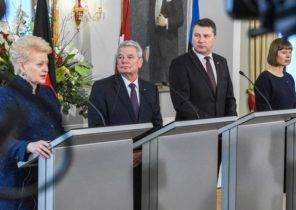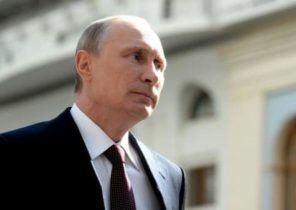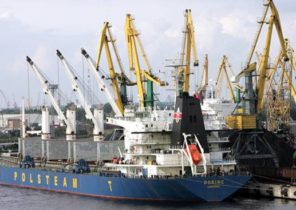
Mr. Chairman, distinguished members of the Committee. Thank you for the invitation and for the opportunity to continue the discussion about the effect in cyberspace. My remarks today will be a continuation of the previous testimony that I gave in the special Senate Committee on intelligence. There I described in detail the research conducted by Andrew Weisberger (Andrew Weisburd), J. M. Berger (J. M. Berger) and myself, on the subject of Russian attempts to harm our democracy by acting through social networks. In this debate I will present new details and their views, as with the 2005 study of the operation effects with the use of cyberspace and help the American government in the implementation of its programmes. Having experience in Western counter-terrorism programs, I believe that we should learn many lessons from our efforts to wage information wars and achieve them successful, and not to repeat in future mistakes.
1) What is the influence of the Russian state through social networks differs from other attempts to influence social network?
As I said on 30 March 2017, Russia the past three years pursuing the most successful in its history, campaign impact, using the Internet, and most importantly, social network, through which it enters a foreign audience and manipulates it. Its influence in social networks is spreading not only Russia and other countries. Greedy businessmen in pursuit of profits and advertising profits are pushing the false and obscene history; political organization with its campaign materials and satirists for the sake of laughter also seek to influence the audience during the elections. However, their actions online are significantly different from the behavior of Russia. Its a hacker attack can be a secret, but she also has an open campaign of influence, using the dirt. Further, Russia in the course of their operations influence use the full set of measures and tools to achieve their goals, and this is different from other players trying to influence the audience.
To create, to push, to share, to discuss, to challenge (SPDO). Effective public sponsors in the sphere of influence carry out all these actions, others — only some.
Create. Russia is using its state media and related conspiracy websites to create propaganda across the spectrum of political, social, financial and sensational topics. This content, most of which are false news or falsified the truth becomes a weapon aimed at specific segments of the electorate that Moscow wants to exert its influence. Moreover, hacking hacking and stealing secrets to give to Russia of nuclear fuel for informational atomic bombs, which are delivered to the target by its state media and hidden media. This information not only fuels the Russian state media, but also gives food for advertising lures used by hunters for profit and political parties, further extending Russian stereotypes and ideas among Western voters.
To push. Unlike other spreaders of false news, Russia simultaneously pushing their propaganda through a variety of media and people. Using clones and auto-bots who seem to be stationed around the world, Russia is simultaneously pushes and intensifies their storyline thus to attract the attention of leading media mainstream. Many other bots in social networks also are promoting false and misleading information for the sake of money or for partisan political interests; but their activity is no synchronization and retry, in contrast to the distribution of Pro-Russian content, and they usually do not lead, and go back in the spread of Russian conspiracy theories.
To share. Supporters, proponents, aggregators (gray accounts) and the hidden agents of influence (black accounts) share materials coordinated Russian propaganda with important nodes in the network on the principle of “one on one” or “one-to-many”. Such coordinated activity is intended to convey, enhance and capture the minds of selected categories of voters, influential content and its themes. By sharing information, they often share content that is attractive for either the left or right flank of the political spectrum, as well as any anti-government and social issues of problematic nature. Often this involved hunters for profit and political propagandists seeking to achieve a high level of hits on a narrow set of topics intended for a more narrow target audience.
To discuss. Open supporters of Russia and veiled accounts bring to the discussion of the Russian theme for a long period of time, introducing the necessary ideas and signals deep into the mind of the target audience. Such a coherent discussion among unsuspecting Americans allows you to make incredible and false information more believable. But bots, hunters profit, satirists and political propagandists often spend one-time transfers of communications, acting on the principle of “fire and forget”.
To challenge. The fierce debate on social networks during the election season — a phenomenon pervasive and widespread. But the Russian players, performing operations of influence, challenge the views and ideas of their opponents unnaturally long and with a characteristic spacing. Secret Russian agents of influence showered his opponents, media celebrities and expert criticisms and push selected topics, depriving the opponents of Russia’s support of a particular target audience and weakening their political position. Such criticism gives the Kremlin an additional advantage, because the enemies of Russia are beginning less likely to use social networks. Other players in social networks is not going to.
Operations affecting all the spectrum: sync white, gray and black effort
In the Russian influence operations in cyberspace, there is an unprecedented synchronization of active measures. Content created by the “white” media (RT and Sputnik News), where there is compromising material, in some magical way creates rigged the truth and the fakes that appear on conspiracy websites who advocate foreign policy positions of Russia, further preferred for the Kremlin candidates and attacked opponents of Moscow. Hackers knockers and sites-the bait quickly make this information available to foreign audiences, expanding the scope of the information campaign. Such all-encompassing information operations Russia in cyberspace on the level of synchronization, scales, repeatability, and speed are significantly higher than the most successful propaganda campaign of the “Islamic state” (banned in Russia organization — approx. TRANS.) last time and election campaigns.
Operation impact in cyberspace succeed when they involve individuals, pushing them to action
Americans are obsessed with social media, in its obsession not to notice the real players who are promoting Russian influence operations in cyberspace. These include the “useful idiots”, “travel” and “agents provocateurs”.
“Useful idiots”. Implementing intervention in the U.S., and now in the European elections, Russia is courting and exploiting the “useful idiots”. It is a term from the Soviet era relating to American politicians, political organizations and government officials, who had inadvertently and without knowing it, strengthen Russian influence on the population of Western countries using Russian dirt and created on the basis of the topic.
“Fellow travelers”. In some cases, Russia luring them to their side “fellow travelers.” It is the Soviet term for people who are sympathetic to the Russian ideology, directed against the EU, NATO and immigration. An army of right-wing alternative in Europe and America today openly conducts the Russian line in life and online, promoting the expansion of Russian influence operations in cyberspace.
“Agents-provocateurs”. Even more dangerous is that Russia today has again started to use “agents provocateurs”. It’s Russian agents, and deceived by the political supporters of Russia who are pushing others and themselves engaged in illegal covert activities to discredit political opponents and to spread lies in cyberspace. American who opened fire at a Washington pizzeria fell victim to the stuffing information #PizzaGate, and this suggests that the effect in cyberspace can lead to serious consequences in the real world. Although this campaign is not directly linked with Russia, the Kremlin now has the opportunity to influence Americans via social networks, turning them into agents provocateurs and pushing them towards certain actions that they carry out, consciously or unconsciously.
All these people help Russia to act online and to split the ranks of the Western electorate using political, social and ethnic problems, and at the same time, the most likely to deny the involvement of the Kremlin to these actions. Overall, the Russian organizers of influence operations will be increasingly more and more sophisticated use of human resources during these operations. The Russian campaign in the Crimea and the attempted coup in Montenegro indicate that Moscow may use the tools from the real world and from cyberspace to win over a particular audience. The actions of “grey media” and open supporters of Russia in Eastern Europe played an important role in influencing the U.S. presidential election. While Russia retains the ability to plausibly deny everything.
It is important to note that America is also not protected from this intrusion, both physical and virtual. During the cold war, Soviet agents recruited by the Americans to implement active measures. And in the recently published ex-MI6 agent Chris Steele (Chris Steele) dossier on the eighth page, it is argued that Russia used in the United States by exiles and people connected with them to conduct offensive cyber operations during the recent campaign effects in American elections. These data have not been confirmed, but if this is true, then using these agents of influence in the United States, Russia will be able to plausibly deny their involvement, while maintaining the possibility to carry out provocations.
2) How the U.S. government can counter the influence operations in cyberspace?
When it comes to American counter-influence operations, we are talking much more than we do. When the United States doing something in this direction, their actions are at best ineffective. And at worst lead to the opposite result. Although since September 11 the United States spent on operations affecting hundreds of millions of dollars, they have made almost no progress in countering al-Qaida, its offspring the Islamic state and other related jihadist groups that are radical propaganda and recruitment via social networks.
The policy and strategy should take into account these failures before we find ourselves in an information war with the state forces to conduct influence operations in cyberspace and large-scale hacking operations. This is a much more complex threat than all those terrorist forces that we’ve faced before. While the cybernetic influence of the United States overly focused on bureaucracy and expensive technical tools, which include systems of monitoring of social networks, which failed to predict the Arab spring, the emergence and strengthening of ISIS, its capture by militants in Mosul, and more recently Russia’s influence on American elections. America will succeed in countering the Russian influence only in the case that will radically change their current approaches, clearly define what it wants to achieve with its strategy of counteracting influence, and then use the services of talented and competent people, escaping from the shackles of technology. Such methodology should be put in the forefront tasks, talent, teamwork and technology — in that order.
Tasks. Seeing what awesome features does Russia by intervening in the us presidential elections, American politicians immediately began to call to counter Russian influence in cyberspace. But the U.S. should not be hasty in this matter. America and Europe do not have a clear understanding of what is happening in the present. For starters the United States should set goals and the scope of Russian influence operations in cyberspace. Secondly, American politics, political organizations and government officials should reaffirm their commitment to facts, not fictions, to restore voters ‘ confidence in themselves through proper communication and feedback. They should also abandon the use of stolen private correspondence of American citizens of the Russian compromising in their political struggle. Third, the U.S. should clearly outline its policy towards the European Union, NATO and immigration, which is currently rather copies the policy of the Kremlin, and not opposed to it. Only after completing these three tasks the us government will make efforts to meet the challenges of the Russian information war, acting through the Department and to those I have mentioned during his previous testimony.
Talents. The fact that Russia has the upper hand in conducting influence operations in cyberspace, is not because it uses some of the most modern and sophisticated technology, and the fact that it uses very talented people. The success of Russia in the information war provides artificial intelligence, and real people. Instead of cooking in the country footage of cyberagent, Russia uses asymmetric methods, involving in this work the criminal cyberpatrol. However, she applies methods of persuasion, coercion and blackmail. Russia purposefully attracted to its ranks of elected people, say, managers and agents of the Russian foreign intelligence service GRU (SIC — approx. transl.), on 29 December 2016 was included in the sanctions list of the USA. The Kremlin is forcing to work in their own interests and other people who have access to sophisticated malware, to hacking technology hacking and botnets.
The US has its own talented and skilled people to carry out cyber operations to influence, but they do not want and will not use them against their opponents. The United States focused on technical expertise, unable to unite their efforts with tactics and information campaigns, and with analysts of the threats. Moreover, the United States in their actions to expertise this kind of overly fixated on all sorts of security clearances and initial training, thereby leaving behind many skilful and talented people. Those few who managed to pass the test are forced to work in conditions of severe informational constraints in public institutions and to use the limited set of tools. As a result, the States receive less qualified staff of specialists at influence operations with disabilities, and are forced to turn to other organizations that they are read, collated and analyzed information from open sources on the Internet. A large part of the qualified influence operations in cyberspace work in the private sector, and these people do not need any official qualifications. Some of them have at some time used illicit drugs, and in addition, they are lighter and easier to work at home than in a government institution.
The coordination work. Russia making great strides in conducting influence operations in cyberspace, because they have learned to skillfully combine the efforts of libertarianists, agents of influence, spies and diplomats, forming a cohesive and consistent strategy. Russia is not to focus on bureaucratic rules, and to achieve their goals using methods of competition and duplication in their work.
Meanwhile, American efforts to counter Russian influence constantly hit the same obstacle of bureaucratic delays and government red tape. Whether it is dealing with terrorist groups or States, the government constantly puts are not directly related to business objectives competing bureaucratic units, which primarily seek to fulfill their direct duties, and not work against the influence in cyberspace. This formal approach we will never be responsible organizations possessing the necessary powers and resources to combat ciberpolitica. In order to create a special working group under one umbrella, so she could work to counter the growing Russian operations in cyberspace.
Technology. For 10 years I have experienced how the United States buy technological tools for the solution of problems of influence in cyberspace, which they are not well understood. Conducting such purchases, the state is overly fixate on analytical packages for social networks, which give birth to a completely incomprehensible charts and diagrams with colored lines and dots. Many of these technology products is completely useless thing, or a pure fake. Such packages can be useful in network marketing, but usually they only interfere with the understanding of influence in cyberspace, and those malevolent forces that lurk in the depths of social networking.
To reveal the operation of influence in cyberspace, it is necessary to find a specific needle among a pile of needles hidden in a vast haystack. This is hackers and sources of influence, seeking to hide their activities on open spaces of social networks. Based on personal experience, I can say: the most effective search technologies and the detection of hackers and agents of influence can give talented analysts who first comprehensively identify the intentions and methods of work of the intruders, and then create automated programs designed to detect these figures. The us government should not buy technical equipment and to provide analysts and expensive large-scale instruments that are quickly outdated and become irrelevant. Instead, it is necessary to allow a skillful and competent specialists to buy or rent in the market the latest and best designs for work in existing and new social networks, and to counter malicious hacker programs.
3) What could make the state and the private sector to counter the influence operations?
In his previous testimony March 30, 2017 I have already set out their recommendations on steps the us government for countering active measures of Russia on the Internet. Company social networking and mainstream media needs to restore the veracity of our information and credibility, providing clarity of our systems. For the month that has passed since my previous statement, the private sector has taken important steps in this direction. This work was led by the company Facebook, which continues its efforts to reduce the number of distributed fake news and only last week deleted from the system 30 thousand fake accounts. Google included in its search engine function to check the facts in the news and improved search algorithm to remove false and misleading information. This week portal Wikipedia has launched a project to verify the veracity of the news and the suppression of information stuffing. There is still such a crucial player for the private sector as Twitter, whose platform is still actively and widely used for the proliferation of forgeries in the context of the influence operations in cyberspace. I hope they will follow the example of other social networks, as their work on the identification and removal of spreading fake news bots and fake accounts can create a powerful barrier against Russia and to prevent her to manipulate and influence the forthcoming elections in France and in Germany.
In conclusion I want to say. My colleagues and I have identified, established and confirmed the fact of strengthening of Russian influence operations in social networks with the help of home computers and multiple credit cards. Operation impact in cyberspace can seem complex in terms of technical execution but in its conception and implementation, they are quite simple. In the struggle of America against the Russian active measures in online technology and money is not a problem. The problem is the people in America created a bureaucracy, which does not allow our country to employ the most talented professionals of information technology in the fight against the main enemies of our democracy.







